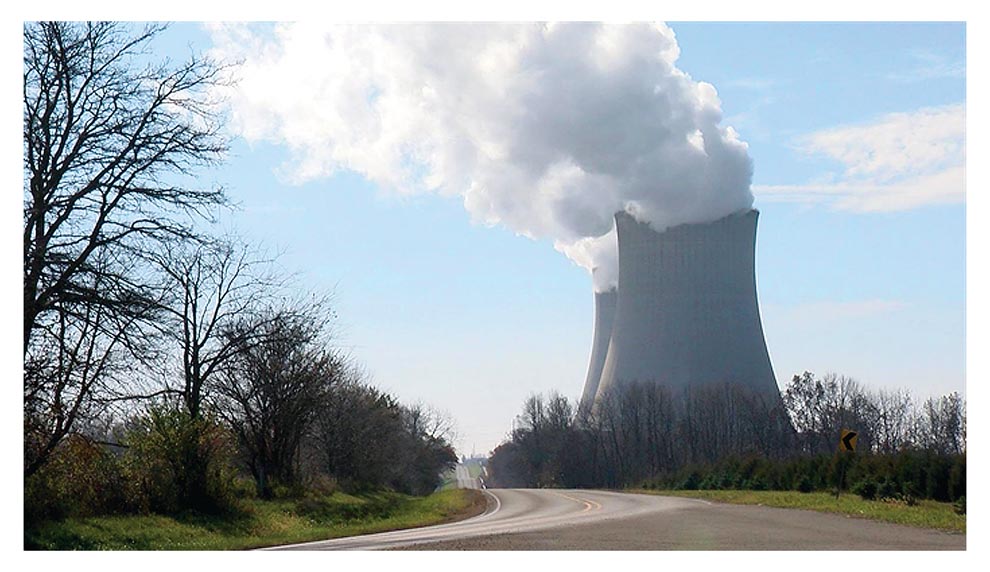
By Jerry Nowicki & Andrew Adams
Governor JB Pritzker on Friday signed into law a measure that will allow for the limited development of new nuclear power generation technology in the state.
The measure, House Bill 2473, does not allow new large-scale power generation facilities like the six plants that are already operational in the state, but rather allows for new smaller-scale emergent technology.
Since 1987, the state has had a moratorium on any new nuclear power construction until the federal government designates a long-term disposal site for nuclear waste — something that has never occurred. The new law will take effect on June 1, 2024, but because permitting nuclear energy takes many years at the federal level, the earliest a nuclear project could be brought online in Illinois would be in the 2030s.
HB 2473 creates a regulatory structure for the construction of small modular nuclear reactors, or SMRs. The bill limits the nameplate capacity of such reactors to 300 megawatts, about one-third the size of the smallest of the six existing nuclear power plants in Illinois. It also requires the state to perform a study that will inform rules for regulating SMRs, which must be adopted by the Illinois Emergency Management Agency by January 2026.
The bill’s proponents say it’s a necessary step as Illinois tries to end its reliance on carbon-emitting power sources over the next two decades. But its opponents say it distracts from Illinois’ efforts to deploy 100 percent renewable energy production and is an endorsement of unproven technology.
The bill passed with bipartisan support in the Senate, 44-7, and the House, 98-8, on the final day of the fall veto session last month. The opposition came exclusively from Democrats. Pritzker vetoed an earlier version of the measure but helped usher the compromise through the legislature.
The bill’s sponsors said after its passage that it has the potential to bolster Illinois’ electric grid reliability as the state’s energy mix becomes increasingly reliant on intermittent technologies such as wind and solar.
Senator Sue Rezin, R-Morris, sponsored the bill in the Senate, while Rep. Lance Yednock, D-Ottawa, was its House sponsor. Rezin noted last month that she is particularly interested in the potential for SMRs to be developed at the sites of former coal plants, avoiding the need to build new transmission lines, although that process could take many years.
David Kraft, an outspoken critic of nuclear energy and head of the Chicago-based advocacy group Nuclear Energy Information Service, testified against the measure at several points during the legislative process.
Kraft said he was concerned about the lack of existing SMR installations and the unproven nature of the technology. While some nuclear reactors of this scale exist in other countries, no commercial SMRs have ever been built in the United States.
Counting Illinois, 11 states currently have some level of nuclear construction bans on the books. Since 2016, five other states have either repealed or weakened their bans. Several of the states that have lifted their bans have done so to pave the way for SMR technology.
But the biggest U.S. player in that industry has seen several recent setbacks.
In November, NuScale Power – the only company with a federally approved SMR design – announced that it was canceling its highly watched “Carbon Free Power Project” in Utah, which would have been the first commercial project with a NuScale reactor. Still, its leaders say the company will continue with its other projects, which are at varying steps of regulation and planning.
Rezin told Capitol News Illinois last month she hopes Illinois and other states’ moves to reverse their construction bans will encourage nuclear energy development in the U.S..
Pritzker did not issue a statement but signed the bill along with 15 others that were sent to his desk following November’s fall veto session. That included a measure a that would require the State to purchase exclusively zero-emission vehicles, such as electric vehicles, after January 1, 2030.
Senate Bill 1769 excludes law enforcement vehicles and vehicles purchased by the Illinois Department of Transportation as part of a program that provides buses to some mass transit systems.
Capitol News Illinois is a nonprofit, nonpartisan news service covering state government. It is distributed to hundreds of newspapers, radio and TV stations statewide. It is funded primarily by the Illinois Press Foundation and the Robert R. McCormick Foundation, along with major contributions from the Illinois Broadcasters Foundation and Southern Illinois Editorial Association.
-Capitol News Illinois

